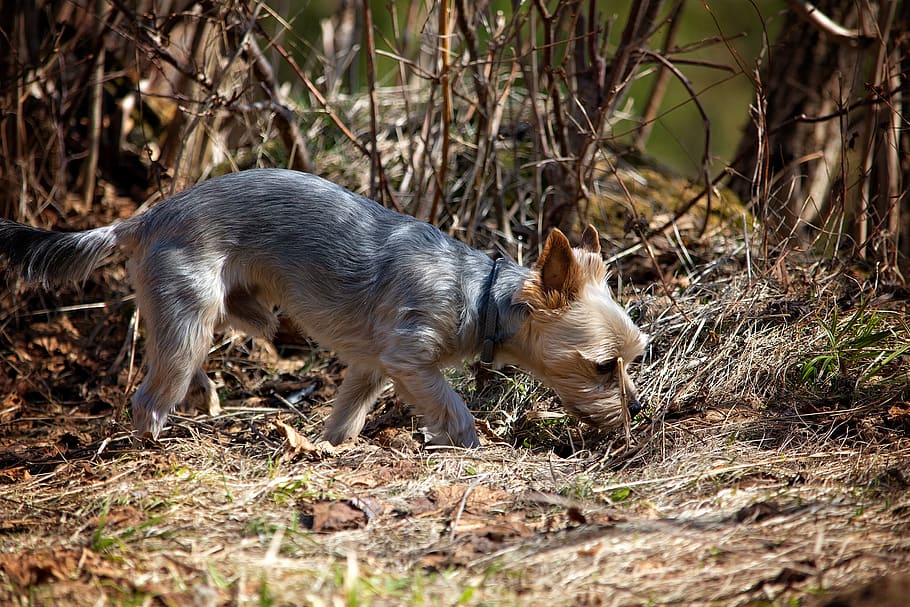Basil is one of the most widely used herbs in cooking, but did you know that it’s also safe for dogs to eat?
Whether it’s fresh or dried basil, there are plenty of benefits for your pup if you choose to share with them.
However, there are a few things to consider before feeding your furry friend this delicious herb. Read on to find out if your pup can partake in the basil bounty!
Can Dogs Eat Basil?

Yes, dogs can eat both fresh and dried basil on a daily basis.
Basil is packed with vitamins, minerals, antioxidants, and other essential nutrients that make it an excellent snack for pooches!
When feeding your dog basil, you should always monitor the amount of basil they receive in order to avoid any potential digestive issues.
Basil is known for its many health benefits and can be a great addition to your dog’s diet. Basil contains antioxidants that can help protect your pup from cancer and other diseases.
It’s also rich in vitamins A, C, and K, as well as calcium, iron, magnesium, and potassium.
Plus, basil has anti-inflammatory properties which can help ease joint pain or discomfort due to arthritis or any other inflammation-related issue.
The herb has also been linked with improved digestion in dogs due to its natural antispasmodic effects which relax their intestines allowing for easier passage of food.
Top 10 Safe and Healthy Seasonings For Your Dog
Can Dogs Eat Basil? Fresh or Dried, Find Out Now!
How Much Basil Can Dogs Eat?

A good rule of thumb is no more than one tablespoon per 10 pounds of body weight per day. If you’re unsure about how much basil is right for your pet, speak with your veterinarian prior to introducing it into their diet.
Basil is a safe herb for dogs–in moderation. It’s important to remember that even if an herb is known to be generally safe, too much of it can still be dangerous.
When it comes to feeding your pup basil, use moderation and always consult with your vet first.
The essential oil extracted from basil leaves can also be used to benefit pets in some cases. It can be used to treat digestive issues, such as vomiting and diarrhea.
Can Dogs Eat Basil? Fresh or Dried, Find Out Now!
Basil Feeding Chart According To Size
| Food | Size | Portion |
|---|---|---|
| Basil | Toy dogs | 1 tbsp per 10 pounds of weight |
| Basil | Small dogs | 1 tbsp per 10 pounds of weight |
| Basil | Medium dogs | 1 tbsp per 10 pounds of weight |
| Basil | Large Dogs | 1 tbsp per 10 pounds of weight |
Basil Feeding Chart According To Age
| Food | Age | Portion |
|---|---|---|
| Basil | 0 – 6 months | Do not feed |
| Basil | 6 – 12 months | Up to 1 tbsp per day |
| Basil | 12 – 24 months | 1 tbsp per 10 pounds of weight |
| Basil | 24+ months | 1 tbsp per 10 pounds of weight |
How Often Can Dogs Eat Basil
When it comes to feeding your dog basil, moderation is key.
You don’t want to overdo it because too much of anything isn’t good for them.
An occasional sprinkle of fresh or dried basil is generally ok as long as it’s not in large quantities.
We recommend giving no more than one teaspoon per 10 pounds of body weight once or twice per week.
Basil isn’t toxic to dogs, so it’s generally safe for them to consume in small amounts. However, due to its high concentration of volatile oils and flavonoids, a dog should not have basil regularly.
You can also switch out regular treats with treats that are made with small amounts of basil such as dog-friendly pesto or other snack recipes using the herb.
Can Dogs Eat Basil? Fresh or Dried, Find Out Now!
Health Benefits of Basil To Dogs
- Basil is rich in antioxidants which can help to protect your pup from certain diseases.
- The Vitamin A and Vitamin K present in basil can help strengthen the immune system of your pet, reducing its risk for future illnesses.
- The high levels of iron found in basil are beneficial for dogs with anemia or low energy levels, helping them maintain healthy blood oxygenation and red blood cell counts.
- Basil also contains anti-inflammatory properties that can help reduce swelling and pain related to arthritis or other inflammatory conditions.
- Its antiseptic properties aid in wound healing, helping prevent infection while promoting healthy tissue growth around wounds or incisions.
- For pets struggling with digestive problems, basil can help reduce nausea and diarrhea.
- Basil has been shown to have a calming effect on dogs, reducing anxiety and even helping them sleep better.
- The high levels of magnesium and calcium found in basil are beneficial for bone strength, good joint health, and overall muscle tone.
- Lastly, basil has been known to have antimicrobial and antiviral properties, making it a great supplement for pets struggling with kennel cough or other seasonal illnesses.
Nutritional Benefits of Basil For Dogs
| Basil Nutrition Facts per 100 grams | % DV * |
|---|---|
| Calories | 22 |
| Total Fat | 0.6 g |
| Cholesterol | 0 mg |
| Sugar | 0 g |
| Glycemic Index | 5 |
| Sodium | 4 mg |
| Carbs | 2.7 g |
| Protein | 3.2 g |
| Vitamin D | 0% |
| Calcium | 17% |
| Iron | 17% |
| Magnesium | 16% |
Are Dogs Sensitive To Basil?
Yes! Some dogs are quite sensitive to basil.
If you think your dog may be sensitive to basil, the best thing to do is to consult a veterinarian.
They will help determine if your pet is having an allergic reaction or another issue from eating the herb.
It’s important to note that while some dogs are allergic to certain herbs like basil, others may be fine.
Additionally, it might be helpful to keep track of any changes in behavior or physical symptoms after consuming the herb, such as:
- Itching
- Sneezing
- Vomiting
- Diarrhea
If you notice any of these signs, stop feeding your pet basil and contact a vet for further advice.
Can Dogs Eat Basil? Fresh or Dried, Find Out Now!
How To Prepare Basil For Dogs
1. Basil Tea
Start by grinding either fresh or dried basil leaves into a fine powder. Then bring two cups of water to a boil and add the basil powder in. Let the water simmer for about 10 minutes, then strain it and let it cool down before giving this tea to your pet. Make sure that the tea is not too hot for your pup!
2. Basil Oil
To make your own basil oil infusion, start by adding half a cup of freshly chopped basil leaves into one cup of olive oil. Allow them to steep at room temperature for a few days before straining out the herbs and storing the infused oil in an airtight container. Use this oil as a topical remedy on your pup’s skin or as a dietary supplement.
3. Basil Powder
To make basil powder, simply grind fresh or dried basil leaves into a fine powder using either a spice grinder or mortar and pestle. Sprinkle the powder onto your dog’s food to give them an extra boost of nutrition! You can also add it to treats like cookies or biscuits to get your pup excited about eating healthy snacks.
How Fast Will Dogs Digest Basil
Different dogs have different digestion speeds, so the amount of time it takes for a dog to digest basil can vary. Generally speaking, most dogs will digest basil within a few hours.
However, if your dog has an especially slow digestion rate, it could take up to 24 hours for him or her to process and metabolize all the nutrients in basil.
Always check with your veterinarian before feeding your pup any new food.
They’ll be able to provide you with more information about how long particular foods take your individual pet to digest and make sure that they’re safe for them.
FAQs
Do Dogs Love Basil?
Yes, dogs love basil! Basil is a fragrant herb that can be used to add flavor to your pup’s meals. It contains vitamins A and C, calcium, magnesium, iron, and other essential minerals.
Plus, it has anti-inflammatory properties which make it a great addition for helping to soothe allergies or digestive issues in pups.
Not only does it taste great but your pup may show signs of pleasure when you offer them some fresh basil leaves.
Just be sure to limit the amount you give as too much could lead to an upset stomach. So why not try adding a little bit of this tasty herb into your dog’s dinner bowl – they’ll thank you for it!
Are Basil Leaves Poisonous?
No, basil leaves are not poisonous for dogs. In fact, they’re a great source of antioxidants and other vitamins!
It’s possible to experience an allergic reaction or sensitivity to eating large amounts of basil leaves, but this is rare.
As with any food, the best way to determine if it’s safe for your dog is to consult your vet before consuming large quantities.
Basil is considered safe when eaten in moderation as part of a healthy diet.
Does Basil Give Dogs Diarrhea?
No, it is generally considered safe for dogs to eat small amounts of basil.
However, too much can lead to an upset stomach or other digestive issues like bloating and gas.
If you are concerned about your dog’s health, check with your veterinarian before feeding them any herbs. Additionally, try introducing the herb gradually to allow their system time to adjust.
Also, keep in mind that some herbs have certain compounds which can be toxic if ingested in large amounts – so it’s best to err on the side of caution when introducing a new food into your pup’s diet.
In Conclusion
Basil is generally safe for dogs to consume on regular basis.
However, some dogs might be allergic to basil which is why it’s important to monitor your dog’s reaction when introducing new foods.
Related article:
- Pet-Friendly Seasonings: Can Dogs Eat Parsley?
- Can Dogs Eat Cinnamon? Explore The Benefits and Risks
- Ginger Woof! Can Dogs Eat Ginger?
- Can Dogs Eat Turmeric? The Super Spice For Dogs!
- Can Dogs Eat Thyme? The Perfect Addition To Your Dog’s Meal
- Can Dogs Eat Sage? How This Superfood Benefits Your Pooch
- Can Dogs Eat Oregano? The Oregano Debate
- Can Dogs Eat Rosemary? Explore The Benefits of This Pet-Friendly Herb
- Can Dogs Eat Mint? Freshen Up Your Pup’s Breath





Leave a Reply